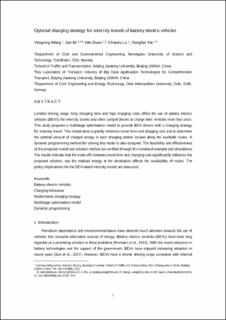Optimal charging strategy for intercity travels of battery electric vehicles
Peer reviewed, Journal article
Accepted version
Permanent lenke
https://hdl.handle.net/11250/2985108Utgivelsesdato
2021Metadata
Vis full innførselSamlinger
Originalversjon
Transportation Research Part D: Transport and Environment. 2021, 96 (102870). 10.1016/j.trd.2021.102870Sammendrag
ABSTRACT Limited driving range, long charging time and high charging costs affect the use of battery electric vehicles (BEVs) for intercity travels and often compel drivers to charge their vehicles more than once. This study proposes a mu ltistage optimisation model to provide BEV drivers with a charging strategy for intercity travel. This model aims to jointly minimise travel time and charging cost and to determine the optimal amount of charged energy in each charging station located along the available routes. A dynamic programming method for solving this model is also designed. The feasibility and effectiveness of the proposed model and solution method are verified through the numerical example and simulations. The results indicate that the trade-offs between travel time and charging cost significantly influence the proposed solution, and the residual energy at the destination affects the availability of routes. The policy implications for the BEV-based intercity travels are discussed.

